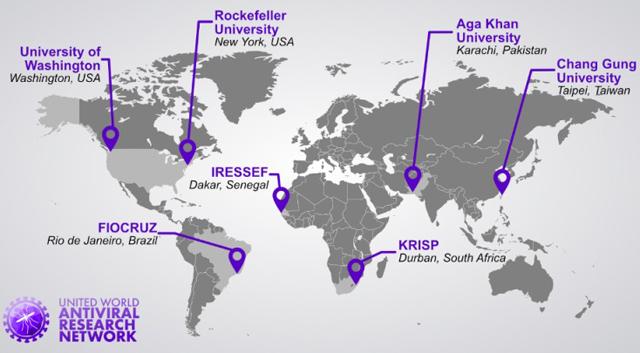NEWS RELEASE from UW Medicine Newsroom

United World Antiviral Research Network (UWARN) forms
UWARN will be part of emerging pandemic virus surveillance; diagnostics, therapeutics and vaccine development; and immune response studies
MEDIA CONTACT: Leila Gray, leilag@uw.edu, leilag@uw.edu
A newly formed United World Antiviral Research Network, or UWARN, will be bringing together researchers from institutions in several countries to spot and confront emerging pandemic viruses.
The network will include investigators from the University of Washington, including its School of Medicine, the UW Medicine Institute of Protein Design, and the School of Public Health; Fred Hutchinson Cancer Research Center in Seattle, and collaborators at Rockefeller University in New York City, FIOCRUZ in Brazil, IRESSEF in Senegal, KRISP in South Africa, Aga Khan University in Pakistan) and Chang Gung University in Taiwan.
An $8.75 million grant over five years from the National Institutes of Health’s Institute of Allergy and Infectious Diseases Center for Research in Emerging Infectious Diseases is funding the creation of the network.
The timing is critical, according to the UWARN leadership, because the network will provide will provide surveillance for emerging pandemic viruses, develop urgently needed diagnostics and therapeutics, and expand understanding of viral immune responses, which is key to vaccine development.
Wesley C. Van Voorhis, professor of medicine, Division of Allergy and Infectious Diseases at the UW School of Medicine, and co-director of the Center for Emerging and Reemerging Infectious Disease, helped connect researchers in the United States and abroad to become part of UWARN.
Van Voorhis said, “We are very excited to establish UWARN, and the new collaborations with the five overseas partners to better address viral pandemics.”
In addition to Van Voorhis, UWARN has three other principal investigators.
They are:
Judith Wasserheit, professor and chair of global health and professor of epidemiology at the UW School of Public Health, and professor of medicine, Division of Allergy and Infectious Diseases, UW School of Medicine.
Michael Gale Jr., professor of immunology at the UW School of Medicine. He is also director of the Center for Innate Immunity and Immune Disease and co-director of the Center for Emerging and Reemerging Infectious Diseases. ,
Peter Rabinowitz, professor of environmental and occupational health sciences, epidemiology, and global health in the UW School of Public health, and professor of family medicine and of medicine, Division of Allergy and Infectious Diseases, at the UW School of Medicine. He is also the director of the Center for One Health Research.
The four principal investigators and their centers came together under the auspices of the UW Metacenter for Pandemic Preparedness.
UWARN will address emerging viral infectious diseases by carrying out research with collaborating partner research laboratories in Brazil, Pakistan, Senegal, South Africa and Taiwan.
The research will develop innovative diagnostic reagents, including human viral-neutralizing antibodies and designed proteins that release light when antibodies to virus are present in blood. This work will include LOCKR technology from the Institute of Protein Design. LOCKR is a nanoscale, bioactive protein switch, designed from scratch, that can work inside living cells to modify internal mechanisms, sense and respond to cues, and perform other tasks.
UWARN research also hopes to improve understanding of how viruses manipulate the human immune system. This research may facilitate the identification of better biomarkers to predict severe disease and the development of host-directed therapies that could improve outcomes from viral infection.
UWARN will serve as one of ten National Institute of Allergy and Infectious Disease Centers within the Centers for Emerging and Reemerging Diseases Network. This network consists of multidisciplinary teams of investigators, working in more than 30 countries.
The Centers for Emerging and Reemerging Diseases Network will be coordinated by the Research Triangle Institute, a large nonprofit research organization with regional and project offices in more than 75 countries, and Duke University, which is known for its leading-edge medical research and for the Duke Human Vaccine Institute. Together they will serve as the CREID Coordination Center.
The NIH grant for UWARN is 1U01AI151698-01
